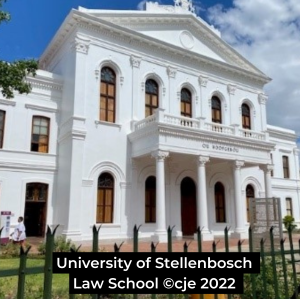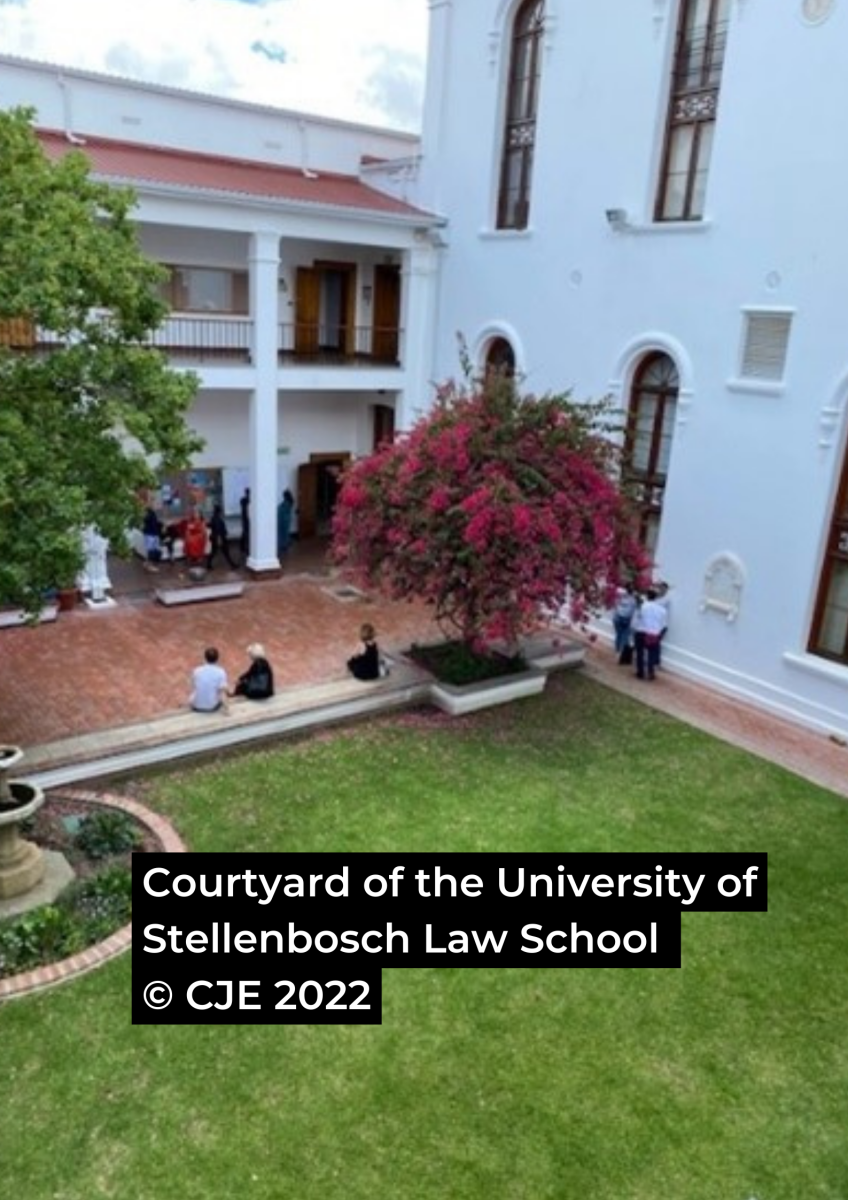Learning from a global nation of law tutors

Blog post by Carol Edwards
When my colleague, Liz Hardie, and I decided to submit a proposal to present a paper at the Global Alliance for Justice Education, International Journal of Clinical Legal Education and South African University Law Clinics Association (GAJE-IJCLE-SAULCA) Conference on Justice Education: Building Resilience and Strong Connections in Times of Global Challenges, I really did not expect it to be accepted. So, you can imagine my surprise, when I found myself on a plane traveling to South Africa to present. This was my first international conference and I approached it with a mixture of trepidation and excitement.
Our presentation was based around supporting online students to engage in the development of peer support communities. After interactively exploring the challenges of working online for both staff and students, we discussed four case studies explaining how we had attempted to develop online communities with both staff and students at The Open University. I was really pleased that our presentation was scheduled for the first full day of the conference, this enabled me to relax and enjoy the varied presentations delivered by a wide range of international presenters. The conference day ran from 8:30 am until about 6 pm, which enabled a vast number of presentations on a wide range of issues. Within this blog I can only highlight a few that were of interest to me.
As a Student Experience Manager one of my key roles is dealing with students’ complaints and recruiting staff, therefore I was particularly interested in the presentation by Carolyn Frazier (School of Law Chicago) about implicit bias, a form of bias which we all experience. Implicit bias is unintentional, automatic and can impact our decisions. The presenter explained how we can fill in the gaps in the information provided without our knowledge. Using these assumptions, we make unconscious decisions about why people behave in a particular way. It was emphasised that this automatic response does not make us bad people, it is part of our hardwiring to make these assumptions. It was suggested that ice breaking activities can be used to tackle this. This presentation linked well with my next choice, “evolving beyond race” delivered by Paulette Williams. As a child we all learn certain beliefs and assumptions which we then use to create stories as an adult. The audience were encouraged to create a new background story by challenging our own beliefs and intentions.
Another area of interest relating to my role is maintaining both student and staff wellbeing. Therefore, the presentation on how Hertfordshire University had attempted to address poor retention by supporting students’ wellbeing was of interest. The presentation was focused on supporting students working in legal clinics, but much of the information was pertinent to any students studying law. Many students who are studying law have to deal with upsetting stories, sensitive matters, and have to meet deadlines. For students working in legal clinics, this is further compounded by dwelling on client cases and feeling personally responsible. Hertfordshire University had put in place a series of interventions to help wellbeing with the hope this will improve their retention. These included appointing a Law School wellbeing lead who ran regular wellbeing sessions, operating an open-door policy for students, providing regular drop-in sessions and introducing a “jam board” which is a place where students can ask questions. Certainly, a number of areas to reflect on here. This presentation linked very well with Przemek Kubiak (University of Lodz) presentation about wellbeing. He made a really interesting analogy to our legs! He suggested that we viewed our legs slightly differently. Leg one was your study leg, and leg two, your life leg. He argued that we need to look after both legs to ensure we operate at our best, a statement which I totally agree with.
Another presentation related to research and made me stop and reflect on my own working methods. Lucy Blackburn (University of Central Lancashire) shared her work reflecting on insider research. She argued that being an insider helps because you have tacit knowledge of the topic. However, this can cause power imbalance and has the potential for bias. This is certainly something for me to reflect on when I am carrying out research with students and staff.
The last discussion I am going to share (and be assured there are many more I could introduce) relates to feedback. From discussions with my tutors and from my own experience, I know that students, when they receive feedback, often focus on the grade. Yet if they are to develop it is the feedback they need to read. Within this session, facilitated by Lucy Yeatman (Liverpool University), the audience discussed feedback methods and it was suggested that feedback could be provided which contained no grade. This is not a new concept but the discussion explored the benefits of telling students which grade boundary their works sits in and providing detailed advice on how to progress to the next boundary. An interesting idea! The discussion continued beyond the presentation room with many people sharing their own practice and it is a discussion I have already had with one OU colleague since returning to the UK.

However, a conference such as this is about more than sitting in the classroom listening to what other people say. During the conference I had the opportunity to chat informally with people from all over the world. While preparing this blog I have realised that I spoke to at least two people from every continent and that in itself, I feel, is an amazing experience. Our conversations ranged over a wide range of legal and pedagogical areas. The one thing that came up again and again, was how valuable clinical legal education is and how it helps some of the poorest and most vulnerable in all societies.
At the conference dinner the range of national dresses was very impressive. Representatives from many countries took to the stage to introduce a little bit of their own culture, and as an observer, I was fascinated to see this. A Ukrainian lady took to the stage, supported by two colleagues from Poland and the Czech Republic, and sang a Ukrainian folk song. The support and applause for her was truly amazing as her country goes through such a difficult time. I can't help but think, if only the ethos of sharing and working together could expand beyond this conference, how better many places would be.
I feel very privileged to have been able to attend this conference and I would like to thank my managers for supporting me in this truly amazing experience.

Carol Edwards
Carol is a Senior Lecturer and Student Experience Manager within the Open University Law School. She joined the OU as an Associate Lecturer in 2015 and became a Student Experience Manager in 2018. She is a Senior Fellow of the HEA.
Carol’s research interests include tackling student and staff isolation via such programmes as online mentoring, The Belonging Project and Tutor wellbeing Conferences.
She is also actively involved in scholarship relating to online teaching pedagogy and assessment feedback. Before joining the OU Carol worked in further education and is still actively involved in the quality management of Open Access courses.